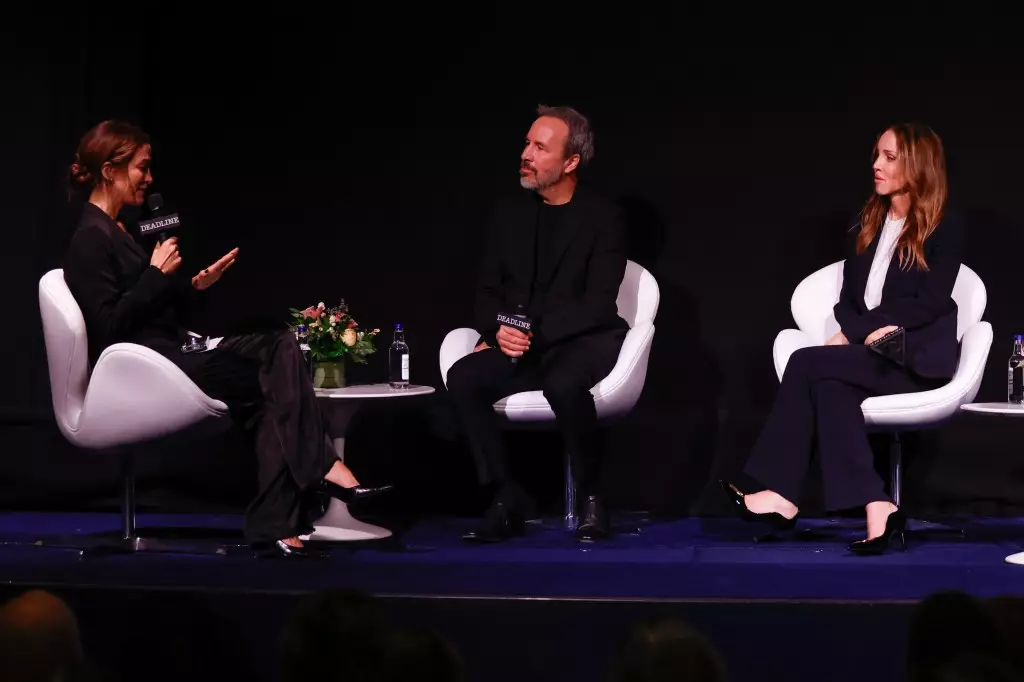Denis Villeneuve’s cinematic interpretation of Frank Herbert’s monumental work, “Dune: Part Two,” has captivated audiences worldwide, establishing itself as a cultural phenomenon. During a recent panel at Contenders London, Villeneuve, alongside producers Mary Parent and Tanya Lapointe, shed light on the intricacies of the film and their aspirations for viewers. Villeneuve noted his commitment to staying true to Herbert’s vision, emphasizing the gravity of a cautionary tale that sounds the alarm about the perils of charismatic leaders and the entangled nature of religion and politics. This thematic focus resonates deeply, prompting audiences to confront pressing contemporary issues within a visually stunning sci-fi framework.
The film picks up with Paul Atreides, played by Timothée Chalamet, as he collaborates with Chani, portrayed by Zendaya, and the enigmatic Fremen to exact revenge against those responsible for his family’s demise. This narrative arc is not merely a tale of vengeance but reflects broader human struggles that have persisted across generations.
Mary Parent remarked on Herbert’s prescience regarding timeless human challenges—power dynamics, ecological stewardship, and warfare. She pointed out that despite advancements in society, we continually grapple with fundamental issues that define the human experience. “Dune,” originally penned in the 1960s, holds a mirror up to contemporary society, reminding us that the follies of the past often resonate in the present. This underlying commentary gives “Dune: Part Two” a richness that fosters not only entertainment but also introspection.
The love story between Paul and Chani stands out as the emotional core of the film. Parent highlighted how Villeneuve beautifully articulates their relationship as two young individuals navigating a treacherous landscape. Their romance, set against the backdrop of political intrigue and conflict, serves as a poignant reminder of the human capacity for love amid chaos. This element brings depth, acting as both a sanctuary and a source of motivation for the characters as they confront overwhelming odds.
Producer Tanya Lapointe emphasized the exploration of power dynamics as a central theme of the film. The portrayal of the Bene Gesserit illustrates that power is not simply about immediate control; it is a long-term strategy shaped by centuries of careful maneuvering and influence. Villeneuve echoed this sentiment, noting the complexity of each female character, particularly Lady Jessica and her own aspirations within the confines of the Bene Gesserit order. Such nuanced character development enriches the storyline, allowing for deeper engagement with the factors that drive humanity’s incessant power struggles.
The filmmakers’ dedication to presenting strong, multifaceted female characters elevates the narrative, showcasing not only their agency but also the intricate web of motivations that inform their actions. This approach fosters a more comprehensive understanding of the intricate balance of power within “Dune,” a theme that, while sci-fi in its setting, remains painfully relevant in today’s sociopolitical landscape.
Villeneuve further prompted audience intrigue with hints about potential future developments in the saga. He playfully discussed the implications of war that may arise in subsequent installments, noting that Paul’s trajectory involves making profound sacrifices for those he holds dear. This narrative tension raises essential questions about the costs of power and the lengths one would go to for love and loyalty.
With a commitment to returning for a third chapter, Villeneuve has established a foundation rich with possibilities and moral quandaries that invite audience engagement long after the credits roll. As “Dune: Part Two” continues to break box office records and penetrate cultural discussions, it becomes clear that Villeneuve’s vision creates not just a film but a lasting conversation about the complexities of humanity, love, and power.
Dune’s impact is thus far-reaching, urging both fans of the original novels and newcomers alike to reflect on their own experiences and societal structures through the lens of an expertly crafted cinematic journey. As the saga unfolds, the intersections of personal and political will undoubtedly continue to resonate, leaving a profound mark on both film history and cultural discourse.



Leave a Reply